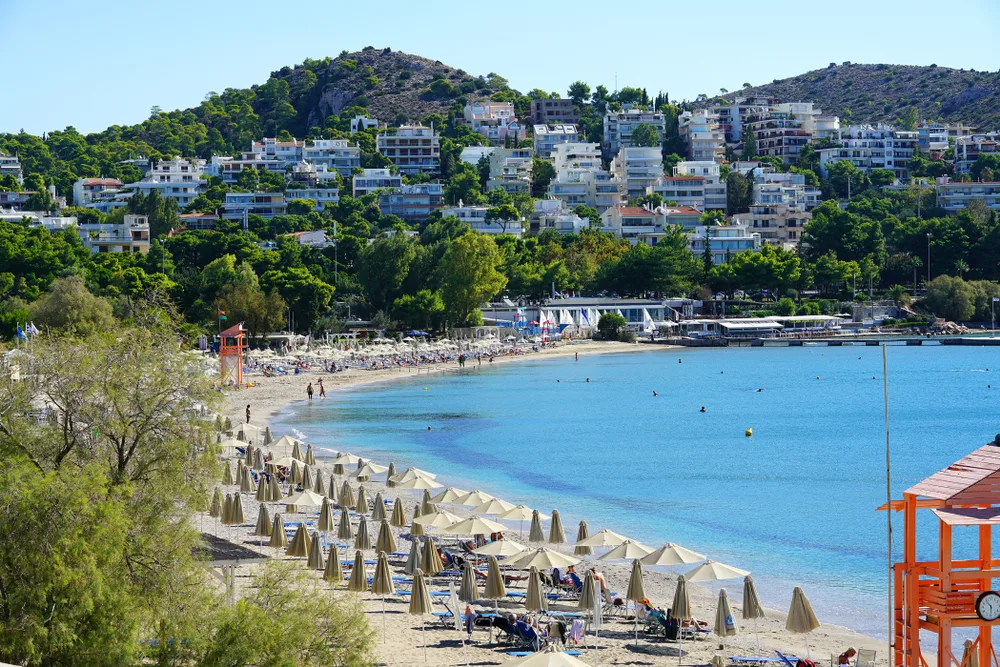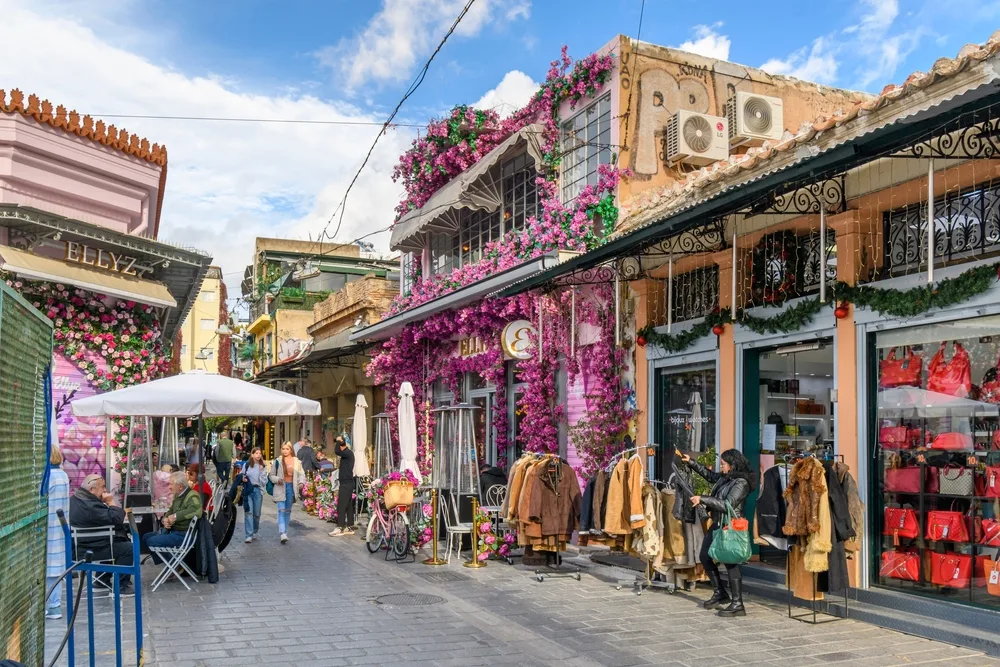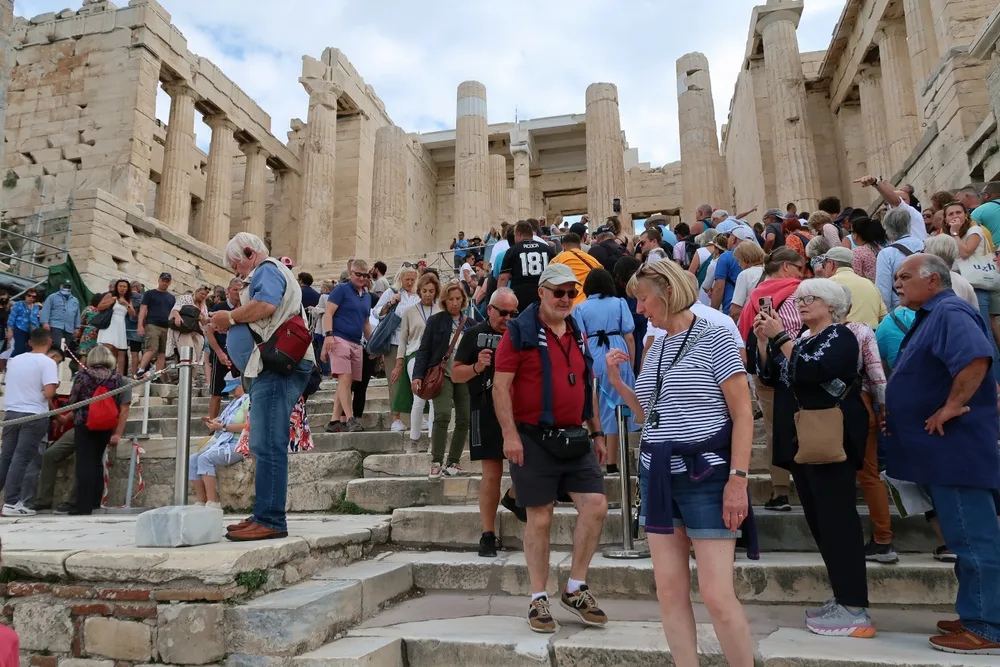What's the best time to visit Athens?
The best time to visit Athens is during the spring and fall shoulder seasons, offering pleasant weather and fewer crowds, ideal for exploring outdoor sites. These months balance outdoor exploration with the opportunity to enjoy local festivals like the Fistiki Fest and the Athens International Film Festival.
Major attractions, including the Acropolis, have season-adjusted hours, and special events such as Greek Orthodox Holy Week and International Museum Day add unique cultural experiences.
Athens is the capital of Greece and also one of the main cities in the classical world. The main things to see are obviously the ancient Greek ruins, such as the ancient Acropolis, which towers above the city, The Temple of Olympian Zeus, and the Agora Museum.
However, it would be a mistake to neglect the more modern parts of the city, such as the bustling Monastiraki Flea Market, Syntagma Square’s changing of the guards, and the cafes of the Pangrati neighborhood.
Making sure that you get the most out of Athens requires careful planning since it is a relatively big city. But don’t worry — we’ll help you figure out the best time to visit Athens in order to see everything you want without getting bogged down by crowds; let us be your guide!
Overall Best Time to Visit Athens

Jekatarinka/Shutterstock
The best time to visit Athens is during the shoulder seasons of fall and spring, when the weather is the best for exploring and you can still enjoy the full expanse of what the city has to offer.
When visiting Athens, the weather is an important consideration to take into account because you will be spending lots of time outdoors to explore all the ancient sites. The spring and fall definitely have the best weather in the city.
According to the UK Met Office, average daily temperatures in April, May, September, and October range from 67-84 degrees Fahrenheit (19.8-28.9 degrees Celsius). It’s warm enough to go to the nearby beaches from May until well into September!
The weather is also generally dry in spring and fall. You can expect plenty of sunshine and clear days, with occasional rain. Evenings and nights can get cooler, especially in the spring when the city can get windy.
Visiting during the shoulder seasons means that you get all the benefits of the high season without the crowds and the prices. Summer is the most popular time for visitors to Athens. The city even started limiting visitors to the Acropolis to 20,000 a day, requiring hourly time slots!
When you visit during the less crowded shoulder seasons, you can still enjoy the great sights that Athens has to offer. However, it will be a much more pleasant experience than visiting during the summer, with less waiting in line and easier attempts to snag a café table.
Many of Athens’s most popular attractions have opening hours that change by the season, but you’ll still have plenty of time to visit them in the spring and fall. For example, the Acropolis has winter and summer opening hours to accommodate different lengths of the day.
In the spring or fall, you can also catch local holidays and see Greek traditions on display. During the spring, visiting during Greek Orthodox Holy Week is a special experience as people engage in candlelit processions and other traditions throughout the city. The spring also has several days, such as International Museum Day, when entry to the most popular attractions is free.
The fall has even more exciting festivals, such as:
- Fistiki Fest, a pistachio festival in nearby Aegina (September)
- Athens International Film Festival (September/October)
- Oxi Day, a national holiday (October 28th)
Cheapest Time to Visit Athens

ATHENS, GREECE, JANUARY – 2020 – Winter urban day scene at ermou, a famous pedestrian street of syntagma district/DFLC Prints/Shutterstock
The cheapest time to visit Athens is in the winter, when it’s the city’s tourist low season and you can get good deals on hotels and other expenses. Prices in Athens are largely dictated by the tourist season.
When there are a lot of tourists, prices go up so businesses can profit off of the demand, but they go down when there are fewer visitors around. Winter is the low season in Athens, which means that prices are also lower.
Hotels in particular drop their rates in the winter. You can find the same hotel for as much as 25% lower in the winter than in the summer.
Since accommodation is one of the biggest expenses you can budget for during travel, this is quite a reduction in your travel costs. Flights also tend to be less expensive in the winter, particularly in January and February after the holiday rush is over.
Although Greeks are Orthodox, they also celebrate Christmas on December 25th like Catholics and Protestants.
After Christmas and New Year’s, you can expect reductions in prices. December in Athens is definitely the most expensive winter month due to the draw of Christmas, but it’s still more affordable than visiting during the summer.
Plus, you can check out popular seasonal attractions such as the outdoor skating rink and the lights at the Stavros Niarchos Foundation Cultural Center.
Least Busy Time to Visit Athens

Athens, Greece – November 27 2021: A colorfully decorated shop and sidewalk cafe with pink and magenta flowers near the Monastiraki flea market/Kirk Fisher/Shutterstock
The least busy time to visit Athens is during the winter, when you can have many of the city’s attractions practically to yourself. Many people avoid visiting Greece during the winter because they think that during the off-season, many businesses are closed, and the country is practically a ghost town.
This may be true for islands that depend on beach tourism, but it isn’t true for the bustling capital. During the winter, you’ll have a time to see how locals live and enjoy a leisurely coffee and shopping spree without too many crowds.
In Greece in general, January, February, and March are the least popular months for visitors. You’ll have no trouble booking a hotel room or reserving tickets to attractions you want to visit.
There are also charming local events and festivals to catch in the winter. In January and February, you can catch the local Carnival, a three-week-long festival before the beginning of Greek Lent complete with people dressing up, flying kites, and roasting meat on street corners.
Winter is also a high point for the city’s cultural calendar, so you can catch events such as film festivals and concerts.
Worst Time to Visit Athens

Acropolis, Athens, Greece, October 18, 2023. Large number of people queuing at the Propylaiu ceremonial entrance and exit gate to the Acroplois complex/Laurence Berger/Shutterstock
The worst time to visit Athens is the summer, when the heat and the crowds make the city almost unbearable. This time has long been the high season for visiting Athens as people combine heading to the Greek islands for a beach vacation with a stop in the city.
Plus, many families can only travel during this time since their kids have time off from school. The result is that millions of people flood into Athens in July and August.
Over 20,000 people a day tramp through the Acropolis alone. Besides the crowds, you will also have to contend with the heat. July and August in Athens can reach temperatures of over 100 degrees.
That’s hardly ideal weather for standing in line for hours waiting to get into a famous attraction!
If you have to visit in the summer, there are ways to combat the crowds and the heat. Visit popular attractions such as the Acropolis very early in the morning or just before closing time to beat the crowds and the heat.
Avoid walking around during the middle of the day. Take breaks from sightseeing to cool off, which you can do in the city’s green parks or in the beaches of the suburbs.
Athens by Month: Climate & Activities

Nejdet Duzen/Shutterstock
Still unsure about the best time to visit Athens? Take a look at our summary of the weather and climate by month below:
January
January in Athens, with temperatures often ranging from 44 to 55°F (7 to 13°C), offers a quieter city experience. It’s perfect for exploring the historic Acropolis and its museum without the crowds, strolling through the Plaka neighborhood, and enjoying the city’s cozy cafes and tavernas.
February
February continues with mild winter weather, ideal for visiting the National Archaeological Museum, exploring the ancient Agora, and enjoying the vibrant nightlife in areas like Gazi and Psiri.
March
As spring begins, March brings temperatures from 47 to 60°F (8 to 16°C). This is a great time for walking tours of the city’s historic sites, enjoying the blooming National Garden, and celebrating the traditional Clean Monday (Kathara Deftera) that marks the start of Lent.
April
April’s pleasant weather, with temperatures between 52 to 68°F (11 to 20°C), beckons for outdoor dining in the city’s many excellent restaurants, exploring the lesser-known neighborhoods like Koukaki, and attending the Easter celebrations, a significant event in Greece.
May
May brings warmer days, from 59 to 76°F (15 to 24°C), perfect for day trips to nearby islands like Aegina, visiting the Temple of Poseidon at Sounion, and enjoying the Athens Open Air Film Festival.
June
June, welcoming summer with temperatures between 68 to 86°F (20 to 30°C), offers ideal conditions for lounging on the Athens Riviera beaches, exploring the Stavros Niarchos Foundation Cultural Center, and enjoying the Athens & Epidaurus Festival for outdoor concerts and theater.
July
July’s warmth, ranging from 75 to 92°F (24 to 33°C), is all about rooftop bars with Acropolis views, discovering the city’s modern art at places like the National Museum of Contemporary Art, and attending the Rockwave Festival.
August
In August, with temperatures of 76 to 92°F (24 to 33°C), escape to the nearby beaches like Vouliagmeni, enjoy the less crowded city as locals head for vacation, and explore the vibrant Monastiraki Flea Market.
September
Welcoming fall, September, with temperatures from 68 to 82°F (20 to 28°C), is perfect for hiking up Mount Lycabettus for panoramic city views, visiting the Odeon of Herodes Atticus, and enjoying the Athens International Film Festival.
October
October’s cooler days, from 59 to 74°F (15 to 23°C), are ideal for exploring the Benaki Museum, taking leisurely strolls in the Anafiotika neighborhood, and enjoying the Athens Food Festival.
November
November, as the air turns crisper, temperatures from 50 to 65°F (10 to 18°C), is a time for exploring indoor historical sites like the Byzantine and Christian Museum, enjoying the local culinary scene, and visiting the vibrant central market of Varvakios Agora.
December
December brings cooler weather, from 44 to 57°F (7 to 14°C), along with festive holiday spirit. Enjoy Christmas decorations and events around Syntagma Square, explore the picturesque area of Kolonaki for shopping, and celebrate the New Year with vibrant festivities in the city center.
Frequently Asked Questions

Athens, Greece – May 26, 2023: Arch of Hadrian Standing at the End of a Busy Street in Athens Greece/Chiyacat/Shutterstock
Still have questions about picking the best time to visit Athens? Here are answers to some of the most common questions we get:
Which month is the best to visit Athens?
The best month to visit Athens is May, when the weather is pleasant, even warm enough for the beach, but the summer crowds haven’t arrived yet.
Which month is the best time to visit Greece?
May and June are also the best months to visit Greece overall. You can combine your trip to Athens with a visit to the islands, which are opening up to tourism but not overwhelmed.
How many days do you need in Athens?
You need three days in Athens at least since there are so many amazing monuments and ancient sites to see.
What is the least expensive month to go to Athens, Greece?
March is the least expensive month to go to Athens thanks to low flight and hotel rates. You can also score deals in the middle of winter and during the fall.
When is Greece’s rainy season?
Greece and Athens get the most rain in the winter, between December and February. Make sure to pack an umbrella if you visit during this time!
So, What’s the Best Time to Visit Athens?
Athens is at its most beautiful in the spring and fall, when mild temperatures and fewer crowds make exploring the city pleasant. There are plenty of festivals to keep you occupied during this time and it is perfect weather for sitting on a café terrace.
So, with so much to see and do, what are you waiting for — book your trip today and experience for yourself all that Athens has to offer. Happy travels!



